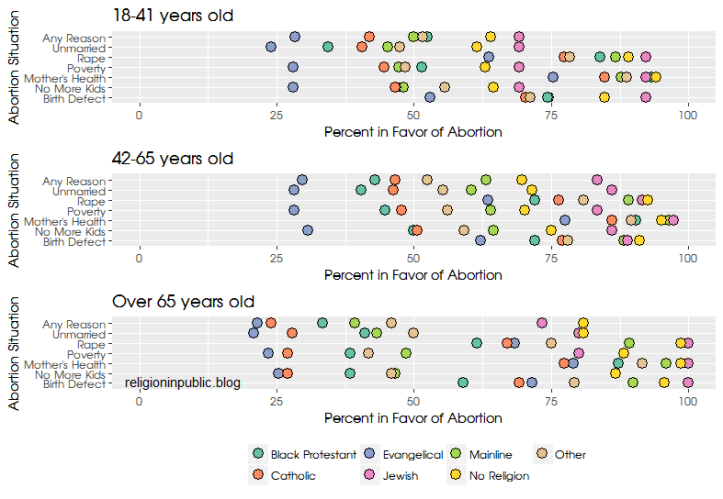Featured Image Credit: American Life League on Flickr
Ryan P. Burge, Eastern Illinois University
On Friday, January 22nd the March for Life conducted their annual rally on the National Mall in Washington, D.C. This march usually coincides with the anniversary of the landmark Supreme Court case Roe v. Wade, which provided a legal framework for abortion access in the United States.
The marchers this year had high hopes that the election of Donald Trump, and his ability to nominate a pro-life justice to the Supreme Court would sway the balance of power and allow for Roe to be overturned. Trump has stated in recent days that, “I will appoint judges that will be pro-life.”
In light of these events, I wanted to take a look at how opinion on abortion has changed in the United States. The best place to look for data on the topic is the General Social Survey, which has asked a number of questions about abortion in the last 40 years. I specifically wanted to understand how abortion opinion has changed among each of the seven religious groups that make up the reltrad classification scheme.
The GSS describes seven different scenarios to respondents and asks them if they would be in favor of an abortion being performed in those circumstances. I am going to just display two of those here. You can find all seven with interactive graphs here.

The most surprising result is the change in opinion among evangelicals in the case of a serious defect in the baby. In earliest year available (1972), 78% of evangelicals were in favor of abortion in this situation. In 2014, the number drops to 60%. It is interesting to note that there was actually an increase in support for abortion post-Roe in these results when 1977 saw 84.3% evangelicals in favor. Since that point there was a nearly continuous decline in support for abortion in this scenario.

The GSS also asks how supportive a respondent would be if, “The woman wants it for any reason.” Here the data does not begin until 1977. What is the most noteworthy here is simply what is not here: a significant trend, for most of the seven groups analyzed. For five of the traditions, the support in 2014 is no more than 6 percentage points different than the baseline number in 1977. The two that break this trend are “Other” which jumped 15% in 37 years and black Protestants who saw a 12 point increase.

I finally wanted to test the argument that I’ve seen a lot in the press regarding younger evangelicals being more politically liberal than their own counterparts. I used just the last three years of the GSS (2010, 2012, 2014) and divided the sample into three generations: 18-41 year olds, 42-65 year olds, and finally those over the age of 65.
It’s clear that younger evangelicals are just as conservative as middle aged evangelicals on the issue of abortion. There is actually no statistically difference between the three generations of evangelicals I analyzed in this data. It’s clear that evangelicalism stands alone when it comes to pro-life positions.
One finding of note, however, relates to older Catholics. In the first two generations, Catholics evince less than 50% support for abortion in most scenarios, but the oldest Catholics in the sample are just as pro-life as their evangelical counterparts. It seems that the ethic of life has had less of impact on younger Catholics, possibly because of diminished attendance patterns for those age groups.
Taken together it seems that abortion is an issue in American political opinion that has changed very little on the last four decades. This consistency is readily apparent across each of the religious traditions and even across different generations of Americans. In spite of the fact that opinion on gay marriage has shifted dramatically even in the last ten years, this leads one to believe that abortion is something different entirely and the deeply entrenched interests on both sides have failed to move a majority of Americans in their favor.
In at least one view, one important reason why abortion views have not shifted along with gay rights opinion is the credibility of competing rights claims. It is hard to make the case that heterosexual unions would be harmed by allowing same-sex marriage, though some did try to argue that. However, while still disputed, the competing right of the fetus with the mother’s rights is much more widely accepted.
Ryan P. Burge teaches at Eastern Illinois University in Charleston, Illinois. He can be contacted via Twitter or his personal website.
Code for this analysis can be found on my Github.

[…] take seamless garment positions. It’s also worth pausing to note that while evangelical are consistently opposed to abortion, many of them are also in favor of the death penalty and therefore would not hold to […]
LikeLike
[…] When it comes to abortion, a signature issue among evangelicals, Ryan Burge finds that they are just as conservative on abortion as others. As Jeremy Castle shows in his forthcoming book Rock of Ages, one reason for this is that […]
LikeLike
[…] They will probably still like guns in two decades. Abortion is my go-to example of this. I wrote a post way back at the beginning of Religion in Public about it. Here’s the upshot: after spending […]
LikeLike